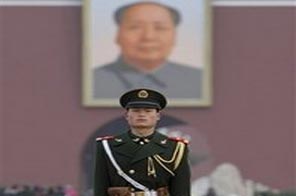Beijing on alert as annual political session opens
BEIJING: Black-clad SWAT teams patrolled downtown Beijing on Tuesday and an AIDS group was ordered to cancel a seminar as part of China's security clampdown ahead of this week's opening of the national legislature's annual session.
Officers on motorcycles and in armored vans circled Tiananmen Square in the heart of the capital, adjacent to the Great Hall of the People where members of the legislature's advisory body begin meeting Wednesday.
The actual legislature, a largely ceremonial body known as the National People's Congress, begins its nearly two-week session Friday.
Foot patrols were stepped-up around the square and retirees mobilized by neighborhood committees to watch for trouble were stationed every few yards (meters) along Chang'an Boulevard that runs along the vast plaza's northern edge.
Police were also cracking down on people visiting Beijing to petition for government legal assistance over various grievances. A group of about half a dozen women who approached the Great Hall carrying shopping bags and wads of documents were forced into a police van and driven away.
As is routine during the session, the highlight of the Chinese political calendar, dissidents and groups working on sensitive social issues were coming under increased pressure.
AIDS activist Wan Yanhai, founder of the Beijing-based Aizhixing Institute, said police had ordered him to cancel a seminar planned for Wednesday to mark International Sex Worker Rights Day.
"The seminar is a perfectly normal activity; we're not opposing anything," Wan said in a telephone interview. "It's a meeting of the people's government, so they should let the people express themselves."
The legislative advisory body, the Chinese People's Political Consultative Conference, opens with a speech broadly outlining issues of national concern delivered by its chairman, the Communist Party's No. 4 ranking leader, Jia Qinglin.
This year's legislative session is expected to focus on economic policy, while many of the hot-button issues like soaring real estate prices in many Chinese cities are expected to get a full airing.
The government, which releases a budget and work plan for the year, is expected to boost spending on education, pensions and medical care yet again, continuing a push begun over the past decade to repair a tattered social safety net.
The congress is also expected to pass legislation on safeguarding state secrets and amend a law on how deputies are selected, correcting a disparity that gave urban Chinese greater representation over their more numerous rural neighbors.
Along the sidelines, the congress will focus attention on an upcoming national leadership transition to begin with a key Communist Party congress in 2012.
Many of the aspirants for top jobs will be seeking to network among congress participants and maximize the opportunity for national media exposure.
Particular attention is being paid this year to Bo Xilai, the party boss of the western city of Chongqing, who is riding a wave of popularity for an anti-gang crusade that has seen dozens of law enforcement officials arrested for collusion.






